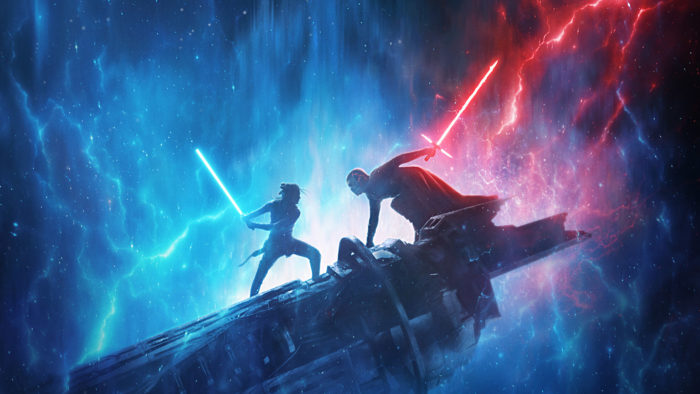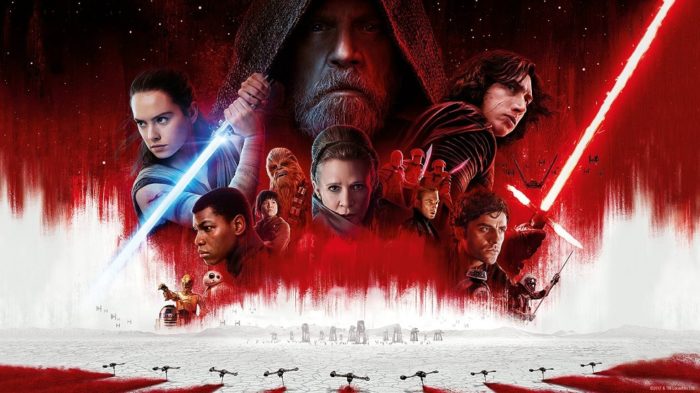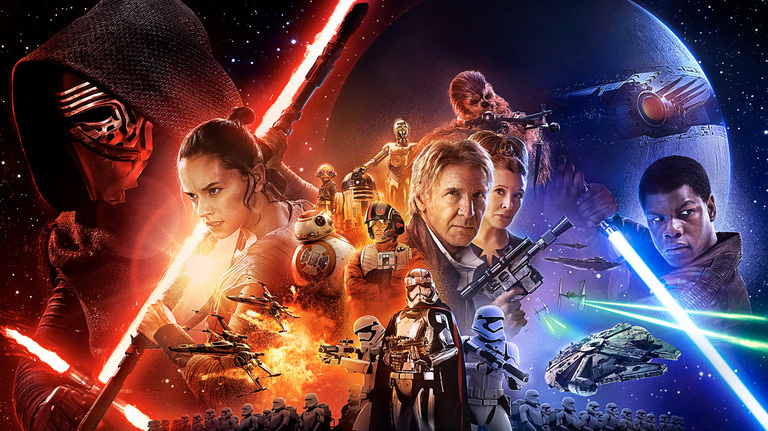So Do We All Just Hate ‘Star Wars’ Now? Is That How It Is?
This week Disney dropped a sort-of-trailer for Star Wars Episode IX: The Rise of Skywalker.1
At least from what I’ve seen, former-fans have never been glummer.
Among the usual and new complaints:
- The Emperor looks like a cartoon.
- The Emperor shouldn’t be back at all.
- Rey has crazy-lightsaber for no reason.
- Rey is a Mary Sue a Mary Sue a Mary Sue.
- Retcon The Last Jedi! and do this yesterday!
- Director J. J. Abrams will just nostalgia-rehash this movie too and it’s gonna suck suck suck so bad.
- If Han Solo ended up a loser, and so did Luke Skywalker, and the Emperor didn’t really die, then the entire classic trilogy is subverted.

Oddly enough, this won’t be one of those “you’re all crazy and the Star Wars are fine, kids” articles. I’m actually sympathetic to these arguments. Especially that last one. Because if in the sequels the good guys don’t actually stay good, and the bad guys don’t stay dead, then yes, the original story really does seem pointless. Sure, you’ve subverted a modern myth that some people may worship. That may help them avoid idolizing fantastical stories in the future. But in so doing, doesn’t this also seem to mock our desire for good heroes and victories (and even mock their true fulfillment in the person of Jesus Christ)?
Anyway, we don’t know all this yet because the movie hasn’t come out. I think it’s proper to be skeptical. But let’s keep Christlike perspective. That I write to myself. I do this because, honestly, I liked The Force Awakens just fine, and felt at best indifferent to The Last Jedi. But you haters are starting to get to me. I don’t like being so pushed about, like a lightsaber caught between two Force-pulls.

So I go back to two SpecFaith articles. The first, from John Otte last year, pleads:
Star Wars Fans, Don’t Act Like New Testament Legalists
In some ways, it’s not surprising that we see such vehemence arise in Star Wars fandom. When George Lucas first crafted the stories set in that universe, he tapped into the power of the monomyth, relying on the work of Joseph Campbell. By doing so, he didn’t just create a story, he created a new mythology, something that could and has tapped into the part of the human psyche that responds to myths and legends. That’s a smart idea. It means that his stories, characters, and themes have resonated deeply with people for decades. That’s why the franchise has such strong staying power.
But there’s a flipside to that as well: that yearning for deeper meaning and mythology is right next door to the part of the human mind that responds to myth and religion with fanaticism. And oftentimes, that fanaticism expresses itself by turning people into gatekeepers. They believe that they have to protect their precious mythology and beliefs from those who don’t appreciate or understand it the way they do. These newcomers are so different from them and don’t fit their ideas of what a true believer looks like, sounds like, acts like, believes like. Threatened with outsiders and newcomers, the temptation is to circle the holy wagons and dictate who can and can’t come in. (Read the rest . . .)

And the second article, from me just this spring, asks more generally:
Why Are Fans Turning Against Their Favorite Franchises?
I don’t like saying “it’s just a movie” or “it’s just a show.” Such a slogan disregards the power of stories for good, evil, or both. The slogan also ignores the real feelings of their fans, and the hard work that humans, God’s image-bearers, put into stories.
But what about people who first embrace story franchises, then despise them to the point of making reams of videos or essays about how terrible they are now?
At that point I would say, “Move on. It’s just a movie/show/whatever.”
Only in a prosperous, first-world society would anti-fans have enough spare time to “review bomb” a movie they haven’t even seen. Or to spend hours arguing with fans or the just-plain-indifferent viewers about whether certain directors secretly “hate” heroes like Superman or Luke Skywalker.
No matter your political or religious perspective (but I repeat myself), the world has greater, more terrible issues. Like abortion. Or whatever degree of racism you think still exists. Or injustice, poverty, and the $22 trillion U.S. national debt.
Even in a secular worldview, anti-fans need to get some perspective. Fast. . . .
No one in a starving nation goes to Yelp to review-bomb the food relief truck.
The fact that many fans feel the luxury of criticizing—with personal ire—any recent franchise installment is simply a side effect of this cultural luxury. Whereas a fan from the 1990s and earlier, who is starving for a new Star Wars movie or superhero adaptation, will more than likely take whatever he can get and appreciate it.
Some of that is a natural side effect. I wouldn’t call that sinful. Why not advocate for the best, or constructively criticize when creators simply reheat the old recipe?
This legitimate criticism, however, can quickly turn into a kind of gluttony. As C. S. Lewis once explained, it’s a kind of gluttony that doesn’t look like gluttony. (Read the rest . . .)
Anyway, here’s the Disney video for you folks to chat about amongst yourselves. I literally have not seen it yet—just as I still haven’t seen that old Gillette shaving-cream advertisement that got the internet so riled. Part of me just doesn’t want to care anymore.
- Once more I must postpone the finale of my Realm Makers 2019: One Hundred Graces series. Once more, readers can blame my book editing. Its current editing phase finally wrapped last night. ↩









































Not that i would ever claim to be an expert on fandoms in general, but i hadn’t noticed the hatred for the new trilogy being any higher than for the prequels.
I’ve given up trying to define my thoughts and feelings on the new films. After seeing The Last Jedi, my feelings could only be summed up as, “Yep, that sure was a movie all right.” Then i saw some people saying the only reason others didn’t like TLJ was because they were racist and/or sexist, and then i saw some other people saying the reason they didn’t like TLJ was because *it* was racist/sexist, and that was when i decided to just give up.
Personally, the last time i can remember liking a Star Wars film was when i was 11 and saw The Phantom Menace in theaters. I’ll share sad Anakin meta from now till kingdom come, but i can’t imagine ever voluntarily watching any of the movies again.
This kind of anticipatory hand-wringing drives me wild, tbh, because it passes judgment on a split-second shot from a much larger movie and uses it to predict a gloomy, nihilistic and amoral outcome, even though such an ending for the third movie in a family-friendly SF trilogy and the climactic ninth movie in a hugely popular saga would be nonsensical.
This isn’t Game of Thrones, it’s Star Wars, where “hope” is a constant watchword and even the ruthless, terrifying Darth Vader can repent at the eleventh hour and be redeemed. How much more his grandson who is visibly and consistently tormented by compassion and “the pull to the Light”? Do we really think that Leia was foolish to believe there was still hope for her son, and that Han Solo died in vain, because Ben Solo is never going to repent but only plunge deeper into darkness and drag Rey down with him? The tragic story of Anakin and Padme aside (which we knew would end badly from the beginning and was always framed as a tragedy, with plenty of ominous clues to their fates along the way), that’s not how Star Wars works.
Anyway, since all the cast and director interviews have used the word “satisfying” to talk about the ending of the sequel trilogy and also talked about redemption and hope being major themes, I’m not even slightly worried that Dark Rey is going to be the ultimate ending of the story, or anything more than a dramatic episode along the way. It may well be a vision like the one Luke saw on Dagobah, where he cut down Darth Vader only to find his own face inside the helmet. Remember when the trailers for ROTJ showed Luke wearing black and a bunch of fans flipped out because they saw it as proof he’d gone or would go to the Dark Side? I do. Fans have always assumed and dreaded the worst for the heroic characters, and talked about Star Wars as though it was some grim military SF drama instead of a fantasy series aimed at 12-year olds (George Lucas’s own words).
I love the sequel trilogy. I think it is actually the most Christian of all the trilogies in terms of its thematic content, its characters, and its portrayal of good and evil. I’m sorry some fans were disappointed not to get whatever it was they wanted out of these movies, but I am very happy with the way the story has unfolded so far, and I am excited to see how it resolves. And I think a lot of naysayers are going to look rather silly when they see how Dark Rey, and the Emperor’s return, and the other elements they’re complaining about actually fit into the whole story.
TL;DR: It’s way premature to pass judgment on the ultimate outcome or spirit of the SW sequel trilogy based on one shot of a deliberately startling and controversial trailer. All the actual evidence points to a happy and, yes, moral ending.
Yeah, you’re right. I think the reason why I’m “meh” about it is that Abrams uses “gimmick” over “subtlety” every time. Kinda like how Jackson made the Hobbit series lame. In the LOTR’s, they kept the adult feel and the subtle character development. That’s what makes the big scenes not feel like a waste. But if all you have is explosions and robots and crap, it just feels like tiring junk.
I disliked the LotR movies myself for exactly the reasons you cite, especially because they changed some of the major characters in ways that completely contradicted the book (which I love and have reread on a nigh-yearly basis since childhood). Aragorn, Elrond, Faramir and Denethor in particular were practically unrecognizable to me as the characters JRRT created, and I felt that a great deal of nuance and character development had been sacrificed to make way for more contrived drama and battle scenes. The Hobbit movies just continued the same trend to the point where even people who had liked the LotR films were rolling their eyes over how absurd it was.
But Star Wars has always been a pulp action series with soap-opera elements, inspired by B-movies and Asian dramas. There is no less character development and no more action in the new movies than in the old ones — it’s just that the people who loved the OT and PT as kids and read all kinds of depth into the characters are now judging the ST with jaded adult eyes and complaining because it doesn’t make them feel the same way. So they see it as an objective fault with the ST films, instead of the inevitable effect of fans’ tastes and expectations (and their memories of what Star Wars is actually like/about) changing as they got older.
As for supposedly lacking subtlety, Rey’s intro scenes in TFA are a master class in characterization — we learn so much about her before she even says a word. And TLJ was full of subtle callbacks to earlier SW movies and lore, of characters grappling with past tragedies and present emotional issues, and many fans complained that it was “too slow” and “wasn’t real Star Wars”.
It’s impossible to please everyone. A lot of viewers said critical, pessimistic things about Empire Strikes Back when it came out as well, and now many fans consider it their favourite. Time will tell.
Hm, that’s interesting. I understand your perspective on the individual characters, but to say the LOTR’s lacked subtlety and nuance isn’t true when you approach them as films and not books. It’s true the battle scenes were over-done–and the approach to portraying violence is also antithetical to Tolkien’s (that was where Jackson’s personality really showed through). But as mass-market films, they had a great deal of subtlety and nuance. They’re just plain good films that made me (and many others) feel deeply. I’ve not felt that way with any of the Star Wars films that I’ve seen.
I still haven’t watched the old Star Wars films, so really I was just commenting on the new ones alone. I saw the first in the new trilogy and wasn’t impressed, and did not feel anything deeply (same with the Hobbit films–snore). I watched the SW’s prequel trilogy when I was a kid (and wasn’t impressed). I also was disappointed by LOST, and other of Abram’s works. I saw the old Star Wars films on Hulu the other day and I suppose I should go watch them to compare. And I should probably go back and re-watch the ones I saw as a kid, too. But I’m beginning to wonder if maybe I’m just not a fan of Star Wars. . . Obviously I’m no expert on the series.
That’s fair. Not everything is for everyone. It’s when people insist that everything must cater to their particular tastes and interests or it is objectively bad that I get frustrated.
Totally!
Insightful article! Thanks for sharing your opinions. I, too, liked The Force Awakens, and wasn’t crazy about The Last Jedi. But I still love the franchise, and will see every installment, even knowing they may infuriate me.
“But in so doing, doesn’t this also seem to mock our desire for good heroes and victories (and even mock their true fulfillment in the person of Jesus Christ)?”
I mainly wanted to respond to this because I don’t feel that way and wanted to explain why. If Star Wars was a Christian allegory then maybe I would feel differently, but Star Wars presents a dualism of good and evil that the Bible doesn’t agree with, so I hold it in a completely different category. Star Wars is all about achieving balance in the Force. A balance between the dark side and the light side, between good and evil; the implication being that good and evil somehow need each other. But the Bible tells us that God will one day wipe out evil forever. No balance, no duality between good and evil is needed. God is good. God is stronger than evil. And God wins. That’s the wonderful thing we as Christians have to look forward to and the Truth in which we can rest our hope during the dark times.
Also, Jesus was and is fully human and also fully God and therefore capable of a perfect victory. Luke Skywalker and Han Solo and all the other heroes of the original trilogy were fully human (or fully whatever alien species they were) and that’s all. Humans, even humans who happen to have been heroes once, fail sometimes. We can’t help it because we’re fallen, imperfect beings. That’s actually what I loved about The Last Jedi: It explored the theme of humans being imperfect and heroes failing and losing hope, but then also told a truth that failure doesn’t have to be the end. You can fail and fail badly, but then you get up, take hold of hope again, sometimes even change your game plan if you have to, and you move forward. In then end, Luke may have died, but it was a self sacrificial death that he chose because he’d taken hold of hope again and wanted to give that hope back to the galaxy by saving the rebels and becoming a legend everyone could cling to, as evidenced by the little slave children back on the gambling planet excitedly telling the story of the battle on the mining planet (sorry I don’t know the actual names of the planets :P) and then the one little boy being able to go outside, look beyond his circumstances, look up to the stars, and embrace his newfound identity as a rebel. Luke died, but he died a hero once again. As much hate as The Last Jedi gets (and people are allowed to hate or love it all they want. I’m not arguing with anyone, I’m simply stating my personal feelings about it), I and at least one of my internet friends actually found it very inspiring.
Further more, I don’t feel that evil coming back in this new trilogy makes the old one pointless any more than WWII made the victories of WWI pointless, or any other war we have in this imperfect world makes the victories of the previous wars pointless. To me, the old victories simply tell me that victory is possible again, and again, and again, if only the good guys are willing to endure, to hold onto hope, and keep fighting.
Beautiful comment. Luke’s story in TLJ resonated powerfully with me too, and is one of the reasons I feel that despite the dualistic and Eastern worldview that underlies the story, the ST has a lot of things to say that Christians can and should appreciate. Luke was not some super-enlightened perfect guru who had learned everything he needed to know and was above temptation or pride. He was still vulnerable to the faults of his youth and the discouragement and disillusionment of middle age. He needed to learn and grow just as the other characters did, and that made him so much more compelling to me than if he had just been the all-wise mentor benignly watching the heroes struggle from the sidelines before stepping in to show them how it’s done.
I think everyone is feeling trepidation for what they’re going to do to end this trilogy. I’m really rather nervous about what they’ll do.
Clone Wars is best Star Wars property. I dunno how Rebels is doing, but tv makes better use of expanded universe.
Everyone’s entitled to their own opinion, and I’ll share mine. I did not like the Force Awakens, but couldn’t figure out why until I saw Star Wars: Rogue One. Although I liked Rogue One, it was sad because everyone died at the end of it: Jyn, Cassian, and all the others who volunteered to go with them to Scarif to help steal the Death Star plans. That’s when it occurred to me, the Force Awakens is a tragedy if you look at the movies in the order that that they happen. So I made the decision that as far as I’m concerned, the Star Wars series ended with Return of the Jedi. Han, Leia, Luke, Lando, Chewbacca and the droids will have their happy ending. I haven’t watched any of the other movies following The Force Awakens and I don’t plan on it. So anyone who likes the Star Wars: The Force Awakens and the following movies from Disney, that’s fine, but I won’t be changing my mind on how I feel toward it. I first Star Wars: A New Hope when I was fifteen, so that trilogy will always be the one that ends right for me.
I like Star Wars, but I don’t like the new movies that have been coming out. I just sort of find them boring. They would have probably been better off keeping the existing books canon, but from what I understand fans complained about those too, so they probably wanted to stay away from that. Ironically, now that fans have seen what Disney did instead, maybe they would be grateful if the Disney movies could be replaced with book based ones.
With the new movies…even if someone could point out a bunch of instances where they ‘technically’ did everything right with plot construction, characterizing Rey, or whatever, I don’t really think the shows worked. Movies can follow the ‘rules’ of storytelling, or follow a preexisting success in some way, but that doesn’t automatically mean they’ll be appealing. Stories tend to need their own life to them outside the technical ‘rules’, and the same goes for characters. Personally, the new films didn’t do that for me.
Technically there’s been dark stuff in the Star Wars verse for a long time. In the books, I heard that Han and Leia’s surviving son never turned good(not for sure because I didn’t read the last book dealing with him). And one time I was at the store and saw a Star Wars book about clone troopers and apparently it was horror.
I felt the same! And this: “Stories tend to need their own life to them outside the technical ‘rules’, and the same goes for characters.” = thumbs up.
I have enjoyed the latest trilogy up to a point, but I didn’t love TLJ mainly because it was such a rehash of all the SW tropes. I was longing for the story to go somewhere new, but it just didn’t. That being said, I”m still a sucker for these movies and will be happy to see it once Christmas rolls around. The trailer gave me goosebumps. I tend to agree that it’s useless to try to pick apart every element of a trailer and decide what the story is going to be based on it. I’m hoping it will all end with a satisfying bow tie. 🙂